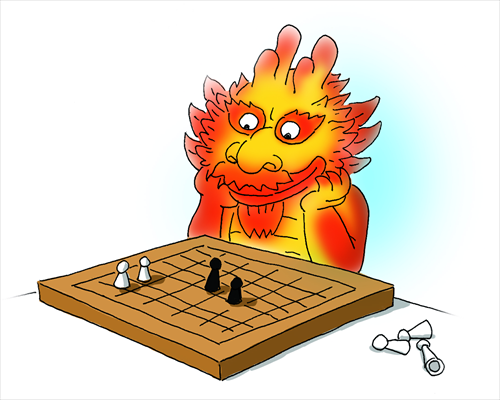US warship hopes to sabotage Beijing-Tokyo-Seoul talks

Illustration: Liu Rui/GT
In a significant trilateral summit over the weekend, Chinese Premier Li Keqiang met South Korean President Park Geun-hye and Japanese Prime Minister Shinzo Abe. It's a welcome development for Asian fraternity. But for Washington's regional hegemonic ambitions, based on divide-and-rule, it must be seen as a retrograde event.
Notably, on the agenda in Seoul was the continuation of "dialogue for regional cooperation in the spheres of economic and social development." That China, South Korea and Japan have engaged in such dialogue has to be seen as a significant step toward normalization of relations given the long history of enmity and disputes between the three regional powerhouses.
It's noticeable that just a few days before the renewal of the trilateral summit, US destroyer USS Lassen sailed into the 12 nautical miles of China-controlled islands in the South China Sea. The timing of the two events is intimately related. The question is: Did the US send its guided-missile destroyer USS Lassen into a hotly disputed region precisely for the purpose of stirring up troubled waters between China and its neighbors?
It seems more than a coincidence that Washington dispatched its warship only days before China joins South Korea and Japan - both US allies - in this landmark regional summit.
Washington's official rationale for why it embarked on such a provocative move does not seem credible. Only in September, US President Barack Obama hosted his Chinese counterpart Xi Jinping in the White House where the two leaders appeared to reach a consensus of understanding on a range of issues, including resolving disputes in the South China Sea peacefully.
Then, despite warnings from Beijing, Washington went ahead to dispatch USS Lassen within 12 nautical miles of islets claimed by China.
Ostensibly, the US said that its naval mission was conducted to reinforce the principle of freedom of navigation in international waters. But China has never acted in any way to restrict international navigation nor does it intend to.
The Financial Times quoted Wu Shicun, director of China's National Institute for South China Sea Studies, as expressing "scepticism over the stated US rationale" for its military intervention.
"Malaysia, Philippines, Vietnam have all built islands in the South China Sea - and Vietnam is still building them," said Wu, adding, "So you can see how America is biased [against] China."
The one-sided US action clearly illustrates the duplicity in Washington's claims that it is "neutral" in territorial disputes and that its latest naval operation is about "freedom of navigation."
Understandably, China has reacted strongly to what it says an unlawful intrusion on its maritime rights. And Beijing has warned that if the US follows through on more intrusive naval missions then it will consider boosting its military forces in the region.
But perhaps the sharpening of tensions in the Asia-Pacific region is exactly what the US is aiming for. An all-out military confrontation is not in Washington's interests. However, if the US can provoke China into asserting its claims more forcefully, then Washington can turn around to its Asian allies and point to the necessity of protection from an aggressive China.
Despite its vain pretensions of "rule of law" and upholding international peace, the last thing that Washington wants to see is for Asian countries to resolve their historical disputes through dialogue and mutual respect.
Xi is scheduled to go on a regional tour to meet counterparts in Vietnam and Singapore later this week. China's defense minister is also slated to meet with fellow defense ministers in Malaysia Tuesday. This is a demonstration of China's long-held policy of fostering dialogue with neighboring countries.
So, in this context of trying to build relations and resolving disputes, the summit between Chinese, South Korean and Japanese leaders in Seoul is, from an Asian point of view, laudable. But from a US stance the development is decidedly unwelcome. Hence, they sent in a warship to sabotage proceedings.
The author is a freelance journalist writing on international affairs based in Addis Ababa, Ethiopia. opinion@globaltimes.com.cn